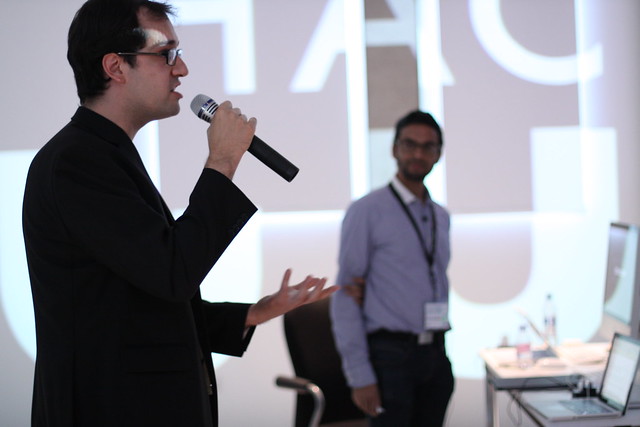I’ve always thought that the term “the cultural sector” was a bit disingenuous, because it makes the assumption that science, engineering and everything else under its umbrella can’t for some reason be a part of “culture”. Ditto “creatives”: it doesn’t take much thought to disprove the conceit, but theatre, music, fiction writing and so on are inherently thought of as creative, while fields like software development and structural engineering are not. What a bunch of hooey.
So I was proud to be a part of Culture Hack Scotland, the first cultural hack day celebrating both the Scottish cultural sector and the country’s incredibly talented tech community. Principally organized by Rohan Gunatillake, my brilliant partner in crime over at the Edinburgh Festivals Innovation Lab, in conjunction with Get AmbITion and Trigger, it was seamlessly organized, beautifully presented and, in many ways, utterly revolutionary.
During my first-ever meeting about becoming Geek in Residence at the Innovation Lab, I made it clear that I wanted to highlight Edinburgh’s independent developer scene, who I believe are every bit as creative as the city’s festivals. Edinburgh contains some of the largest arts festivals in the world (including the largest). The University of Edinburgh also has one of the best-ranked Computer Science courses in Europe. Both are propelled by the fiercely independent, anarchic, creative energy that pervades the city, and while it sometimes feels like the city’s infrastructure wants to stub this out, Culture Hack Scotland embraced it in a way that was both fun and greatly respectful to everyone who came. The outputs speak for themselves.
There is a division between the cultural and technical sectors, which has traditionally led to abusive relationships between the two. Organizations that look down on developers and cowboy digital agencies that see cultural organizations as cash cows are definitely still around, but I think they’re diminishing, in part because these sectors need each other – and they’re merging. Cultural organizations need to have in-house digital knowledge; as technology improves, the digital agency skillset begins to incorporate storytelling, animation, game-playing, music and more. Case in point is the meteoric rise of Apple, which famously describes itself as being at the intersection between technology and the liberal arts.
Regular readers will remember that last year I was involved in an event called Intersection: Publishing, which aimed to do something similar for the publishing industry. Earlier this year, one of my co-organizers, Perini’s Paul Squires, and I hatched a plan for Book HackDay, which took a different tack by exploring the form of the book itself rather than examining how technology could save the industry. With support from a raft of excellent partners, it was a great success. My contribution was to design and establish BookHackers, a social community that aims to provide a permanent space to discuss the evolution of the book. It’s not affiliated with my Edinburgh Festivals work, but I believe it’s in a similar spirit.
I’m doing this as part of Idno, my social technology imprint. If publishing companies can have imprints, why not developers?
Image: Ben talks sense [hah!] by festivalslab, released under a Creative Commons license.

Leave a Reply